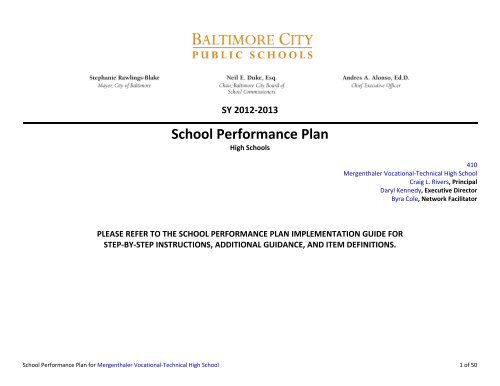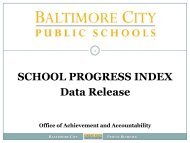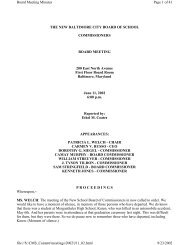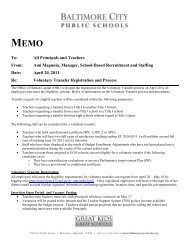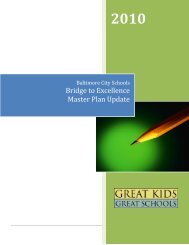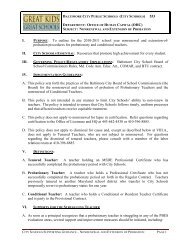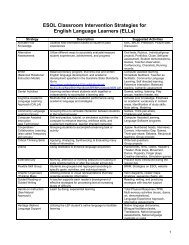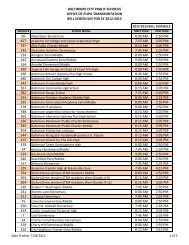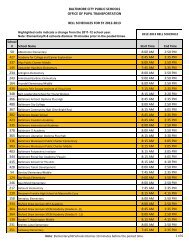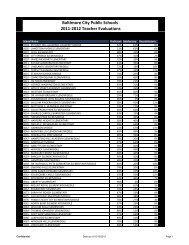SY 2012-2013 School Performance Plan - Baltimore City Public ...
SY 2012-2013 School Performance Plan - Baltimore City Public ...
SY 2012-2013 School Performance Plan - Baltimore City Public ...
You also want an ePaper? Increase the reach of your titles
YUMPU automatically turns print PDFs into web optimized ePapers that Google loves.
<strong>SY</strong> <strong>2012</strong>-<strong>2013</strong><br />
<strong>School</strong> <strong>Performance</strong> <strong>Plan</strong><br />
High <strong>School</strong>s<br />
PLEASE REFER TO THE SCHOOL PERFORMANCE PLAN IMPLEMENTATION GUIDE FOR<br />
STEP-BY-STEP INSTRUCTIONS, ADDITIONAL GUIDANCE, AND ITEM DEFINITIONS.<br />
410<br />
Mergenthaler Vocational-Technical High <strong>School</strong><br />
Craig L. Rivers, Principal<br />
Daryl Kennedy, Executive Director<br />
Byra Cole, Network Facilitator<br />
<strong>School</strong> <strong>Performance</strong> <strong>Plan</strong> for Mergenthaler Vocational-Technical High <strong>School</strong> 1 of 50
Your <strong>School</strong>’s Instructional Leadership Team<br />
Name Position<br />
Craig Rivers Principal<br />
Marcia Martin Special Education Assistant Principal<br />
Jenifer Perkins History/Facilitator<br />
Zaharah Hill Educational Associate<br />
Jermaine Skinner English Teacher I/Facilitator<br />
John Blake Algebra II & Geometry Facilitator<br />
Muriel Cole-Webber Assistant Principal-CTE Facilitator<br />
Chris Stewart Mathematics Administrator<br />
Muriel Cole-Webber Social Studies Administrator<br />
Laura Schulz Science Administrator<br />
Richard Gold English III/Facilitaor<br />
Gena Yates English II/Facilitator<br />
Cynthia Robinson Biology/Facilitator<br />
Vonciel Anderson Chemistry/Facilitator<br />
James Allison Algebra I/Facilitator<br />
Key Points of Contact at Your <strong>School</strong><br />
Position Name Email Contact<br />
Professional Development Point of Contact/Monitor Zaharah A. Hill zahill@bcps.k12.md.us<br />
New Teacher Mentor Coordinator Anthony Schell ASchell@bcps.k12.md.us<br />
<strong>School</strong> Family Council Representative Sherri Holt SHolt@bcps.k12.md.us<br />
Family and Community Engagement Representative Muriel Cole-Webber MCwebber@bcps.k12.md.us<br />
<strong>School</strong> <strong>Performance</strong> <strong>Plan</strong> for Mergenthaler Vocational-Technical High <strong>School</strong> 2 of 50
Reflect on <strong>SY</strong> 2011-<strong>2012</strong> <strong>School</strong> <strong>Performance</strong> <strong>Plan</strong><br />
Guidance: Complete these questions by reflecting with your Instructional Leadership Team, Executive Director and Network Facilitator prior to Step 1. Record<br />
your answers below.<br />
1. What progress did you make toward meeting your SPP <strong>SY</strong> 2011-12 goals?<br />
Goal 1: By the end of the 2011-<strong>2012</strong> school year, our teachers will be equipped with the necessary tools to deliver high quality instruction that benefit<br />
students, by partaking in professional development that addresses Common Core and overall weaknesses within our institution.<br />
Overall, Professional Development was a success. However, our goal specifically stated that we would address the Common Core and we partially infused it.<br />
This year we focused heavily on the Instructional Framework with efforts to prepare our teachers and students for success. As a result, we will attempt in the<br />
<strong>2012</strong>-<strong>2013</strong> SPP to find ways that will intensify the delivery of the Common Core Standards.<br />
Goal 2: By the end of the 2011-<strong>2012</strong> school year, our students will evolve into global leaders by receiving the essential tools such as; advanced literacy skills,<br />
advanced mathematics skills, engaging tasks that relate to students’ real life experiences, college preparedness, and a career and technological education.<br />
This particular goal will and should grow from academic school year to the next. There weren’t any assessments made or created to track the regression or<br />
progression of students receiving these advanced skills or engagement. Consequently, we have learned that when formulating our school wide goals they<br />
must be created with the SMART components. Next year, we will focus on using formative assessments to track and monitor the academic student results<br />
we seek.<br />
Goal 3: By the end of the 2011-<strong>2012</strong> school year, our administration, leadership team and educators will collaborate, in order to create common bi-weekly<br />
assessments, use multiple data resources and Common Core to guide instruction, vertically and horizontally lesson plan, and monitor each other’s<br />
professional growth in our established learning community, that includes our ED, Facilitator, and Support Network staff.<br />
As an instructional staff, we have come so close to attaining this goal and seek positive results once all stakeholders have been trained and equipped with<br />
the necessary tools. Data Link was a valuable resource to help kick off the creation of common assessments. However, no one was aware that only<br />
individuals with lead roles in this data system could create common assessments for classroom teachers. Taking that option away from teachers made it<br />
hard for the process to continue with fidelity. As a result, the attempt to use that information to guide instruction came to a halt. We have reflected and<br />
created an action plan, so by next school year, we will be prepared due to the challenges and obstacles we incurred during this academic school year.<br />
2. Were your strategies fully implemented, partially implemented, not implemented at all? Why?<br />
From a diagnostic point of view, our strategies were partially implemented. Many of the strategies listed in goal one were achieved. Goal two and three<br />
strategies would have been more effective if the Data Link issues were discovered and corrected at the earlier stages of implementation.<br />
3. What evidence of actual impact did you see on instructional practice and/or student learning?<br />
The evidence of actual impact on instructional practices and student learning was apparent in several domains. Objective writing was evident in every class<br />
which guided teachers and students to focus on the actual skills and strategies being taught during daily lessons. Collaborative planning every Tuesday<br />
allowed for teachers to analyze student work, visit each other’s classrooms, examine the instructional framework rubric and the different domains, preview<br />
the Common Core Standards, and attempt to create common assessments throughout the school. Our professional learning community strengthened and<br />
<strong>School</strong> <strong>Performance</strong> <strong>Plan</strong> for Mergenthaler Vocational-Technical High <strong>School</strong> 3 of 50
teachers felt more comfortable sharing what worked and didn’t work during their lessons. Having knowledgeable teachers who make the effort to reach out<br />
to their coaches, colleagues, and administrators to improve their craft always impacts student learning. Cooperative learning increased as we used this<br />
Marzano's high yield instructional strategy as one of our professional learning cycles in attempt to increase the accountable talk and academic collaboration<br />
amongst students. Impactful and engaging teaching/lessons are a part of our main focus heading into the <strong>2012</strong>-<strong>2013</strong> academic school year so that the<br />
impact on student learning is more evident and clearly defined.<br />
4. What practices are in place that we are unable to link to increased student achievement?<br />
Teachers were creating common pre and post assessments monthly to track student growth or regression of skills and strategies; however, the capabilities<br />
in Data Link did not allow the teachers to share the assessments created. Some of our teachers (the creators of the common assessments) were the only<br />
individuals who were successful with testing their students. In addition, the leadership team was unable to monitor and track the regression or progression<br />
of student results from the teacher created exams because Data Link has that particular feature unavailable (only parents and students can see the results of<br />
teacher created assessments). We are now aware that whoever is selected to be a facilitator for the <strong>2012</strong>-<strong>2013</strong> academic school year, will need leadership<br />
capabilities in the system in order to make sure everyone can use the common assessments to ensure that the Data Team Processing and Decision Making<br />
for Results meetings run accordingly.<br />
5. If your school participated in the 2011-12 <strong>School</strong> Effectiveness Review (SER) process, how will that feedback influence your strategic planning for <strong>2012</strong>-13?<br />
Our school partook in the 2010-2011 <strong>School</strong> Effectiveness Review (SER) process. As a result, we created a two year action plan to address our areas for<br />
growth. From that action plan we created a year-at-a-glance professional development calendar. We still use that feedback to assist the Instructional<br />
Leadership Team with our instructional decision making for results and that valuable constructive criticism often guides our focus. Many of the areas<br />
addressed in the SER are still a part of our <strong>2012</strong>-<strong>2013</strong> needs assessment.<br />
<strong>School</strong> <strong>Performance</strong> <strong>Plan</strong> for Mergenthaler Vocational-Technical High <strong>School</strong> 4 of 50
Step 1: Collect and Chart Data<br />
Effect Data: Outcomes or Results<br />
• State Test Data (MSA, HSA)<br />
• Stanford 10<br />
• District Benchmarks and End of Course Assessments<br />
• Formative Assessments (teacher developed assessments)<br />
• Diagnostic Assessments (RISE, STEP, DIBBELS, NWEA)<br />
• Attendance<br />
• Discipline/Suspension Data<br />
• Student Work (i.e. writing samples)<br />
• Grades & GPA<br />
• <strong>School</strong> Effectiveness Review (if applicable)<br />
• Climate Survey<br />
• Advanced Placement (AP) test rate and scores<br />
• PSAT/SAT test rate and scores<br />
ACCESS DATA LINK & THE RAPID RESPONSE TOOL DIRECTLY BY VISITING: https://ebs.bcps.k12.md.us/bcpss.html<br />
<strong>School</strong> <strong>Performance</strong> <strong>Plan</strong> for Mergenthaler Vocational-Technical High <strong>School</strong> 5 of 50
<strong>School</strong> Demographics<br />
08-09 09-10 10-11 11-12 12-13<br />
Total Enrollment 1317 1469 1602<br />
% of Students by Subgroup<br />
• African-American 94.8 95.2 95 95.9<br />
• American Indian/Alaskan Native 0.0 0.0 0.0 0.1<br />
• Asian/Pacific Islander 0.2 0.3 0.1<br />
• Hispanic 0.6 0.5 1 0.9<br />
• White 4.4 4.1 4 2.9<br />
• Free and Reduced Meals (FARM) 8.4 12.1 10.6 82.2<br />
• English Language Learners (ELL) 0.0 0.0 0.0 0.1<br />
• Students with Disabilities (SWD) 23 14.7 26.8 15.1<br />
% Mobility 13.9 13.7 14.8<br />
% of Highly Qualified Teachers 31.8 14.7<br />
% of Teachers with Less than Five Years of Experience<br />
Principal’s Years of Experience<br />
Principal’s Tenure at the <strong>School</strong><br />
<strong>School</strong> Improvement Status<br />
Attendance Data<br />
08-09 09-10 10-11 11-12 12-13<br />
All 87.9 85.8 85.9<br />
% habitually truant > 20 days 32.7 39.1 37.6<br />
% chronically absent < 5 days 16.6 11.7 14.3<br />
<strong>School</strong> <strong>Performance</strong> <strong>Plan</strong> for Mergenthaler Vocational-Technical High <strong>School</strong> 6 of 50
Cohort Graduation Rate<br />
Leaver Graduation Rate<br />
Graduation Rate<br />
08-09 09-10 10-11 11-12 12-13<br />
Graduation Rate 91.73 85.86 89.21<br />
# of Graduates 244 261 281<br />
<strong>School</strong> <strong>Performance</strong> <strong>Plan</strong> for Mergenthaler Vocational-Technical High <strong>School</strong> 7 of 50
Asian/Pacific Islander<br />
HSA Data (% Passing)<br />
Subject Area Algebra Biology English 2<br />
Year 08-09 09-10 10-11 11-12 12-13 08-09 09-10 10-11 11-12 12-13 08-09 09-10 10-11 11-12 12-13<br />
All 48.3 32.9 23.4 59.2 54.7 32.5 47.6 48.2 43.8<br />
Subgroups<br />
African-American 23.3 32.6 44.0<br />
American Indian/Alaskan Native<br />
White 41.2 45.0 47.4<br />
Hispanic 100.0<br />
SWD 6.6 9.3 13.5<br />
Asian/Pacific Islander<br />
HSA Data (% Passing)<br />
Subject Area Government<br />
Year 08-09 09-10 10-11 11-12 12-13<br />
All 71.3 66.5 48.1<br />
Subgroups<br />
African-American 48.3<br />
American Indian/Alaskan Native<br />
White 50.0<br />
Hispanic<br />
<strong>School</strong> <strong>Performance</strong> <strong>Plan</strong> for Mergenthaler Vocational-Technical High <strong>School</strong> 8 of 50
Advanced Placement Course Enrollment and <strong>Performance</strong><br />
Year 08-09 09-10 10-11 11-12 12-13<br />
# of AP Courses Offered 1 2 2<br />
# of Students Enrolled in AP Courses 7 22<br />
# of AP Examinations Taken 10 22 27<br />
# of AP Examinations Scored “3” or Higher 0 0 1<br />
<strong>School</strong> <strong>Performance</strong> <strong>Plan</strong> for Mergenthaler Vocational-Technical High <strong>School</strong> 9 of 50
Charting Additional Effect Data Points<br />
Guidance: Additional Effect Data should be charted in the Charting Additional Effect Data table below.<br />
Gather and organize data in order to gain insights about teaching, learning, and leadership practices. Consider charting data that is disaggregated and<br />
triangulated.<br />
Data Point<br />
District Benchmark and End of Course Assessments<br />
English Benchmarks:<br />
English I Test C 6.2% 39.6% 54.2% 371<br />
English I Test B 6.1% 36.8% 57.1% 380<br />
English I Test A 0.3% 20.9% 78.9% 369<br />
English II Test C 0.3% 14.1% 85.6% 355<br />
English II Test B 0.9% 23.4% 75.7% 321<br />
English II Test A 0.5% 15.1% 84.3% 185<br />
Biology Benchmarks:<br />
HS Biology Skills, Processes & Chemistry of the Cell Unit Test 1.4% 8.4% 90.2%<br />
346<br />
Algebra Benchmarks:<br />
Algebra/Data Analysis Test C 1.3% 18.3% 80.4% 387<br />
Algebra Data Analysis Test B 6.6% 21.4% 72.0% 346<br />
Algebra Data Analysis Test A 0.0% 11.3% 88.7% 319<br />
(End of Course Assessment results are currently unavailable)<br />
----------<br />
What do the data tell you about trends in student achievement<br />
and other aspects of your school performance?<br />
According to the benchmark data, major interventions need to be put in place<br />
to address the academic needs of our students. For example, English II<br />
benchmark C is considered a mock HSA for our students. Close to 86% of our<br />
sophomores were basic. On the other hand, Mrs. Yates sections resembled<br />
some of the highest scores (one of her three courses is honors).<br />
In Algebra I, the disparities from class to class is tremendous. In Mr. Allison's<br />
classes his students out perform all freshman, including those in honors. Class<br />
results range from 45% basic to 92% basic. The same dynamics are present in<br />
the English II benchmarks.<br />
Collaboration occurs every Tuesday; however the emphasis on best practices,<br />
student task analysis, skills and strategies need to be the major focus from here<br />
on out. The Data Team Processing will help many of the disparities subside as<br />
we attempt to put forth more an effort to ensure we are reflecting and growing<br />
from one another's instructional strengths and weaknesses.<br />
<strong>School</strong> <strong>Performance</strong> <strong>Plan</strong> for Mergenthaler Vocational-Technical High <strong>School</strong> 10 of 50
9th grade RISE Assessment Pre-test):<br />
Word Recognition and Decoding Level<br />
Proficiency High 73<br />
Proficiency Low 155<br />
Warning 107<br />
Total: 335<br />
Vocabulary Level<br />
Proficiency High 62<br />
Proficiency Low 163<br />
Warning 110<br />
Total: 335<br />
Morphology Level<br />
Proficiency High 67<br />
Proficiency Low 160<br />
Warning 108<br />
Total: 335<br />
Sentence Processing Level<br />
Proficiency High 63<br />
Proficiency Low 163<br />
Warning 109<br />
Total: 335<br />
Efficiency of Basic Reading Comp Level<br />
Proficiency High 78<br />
Proficiency Low 147<br />
Warning 110<br />
Total: 335<br />
Reading Comp Level<br />
Proficiency High 60<br />
Proficiency Low 129<br />
Warning 146<br />
Total: 335<br />
Data Point<br />
What do the data tell you about trends in student achievement<br />
and other aspects of your school performance?<br />
Our student’s vocabulary level was the lowest next to reading comprehension.<br />
The results mirror the vocabulary acquisition issues occurring from class to<br />
class. To address this issue that is apparent throughout Mergenthaler (not just<br />
in the 9th grade) we have pre and post assessments in place to track each<br />
student. In addition, teachers will use those results to provide appropriate<br />
interventions and differentiate instruction.<br />
<strong>School</strong> (Post test <strong>Performance</strong> results are <strong>Plan</strong> not for unavailable Mergenthaler yet) Vocational-Technical High <strong>School</strong> 11 of 50<br />
----------
Monthly Attendance<br />
September<br />
Teacher: 95.2%<br />
Student: 88.4%<br />
October<br />
Teacher: 90.5%<br />
Student: 84.7%<br />
November<br />
Teacher: 92.3%<br />
Student: 83.0%<br />
December<br />
Teacher: 93.4%<br />
Student: 80.2%<br />
January<br />
Teacher: 99.2%<br />
Student: 81.4%<br />
February<br />
Teacher: 92.3%<br />
Student: 80.6%<br />
March<br />
Teacher: 92.7%<br />
Student: 80.0%<br />
April<br />
Teacher: 90.5%<br />
Student: 78.3%<br />
May<br />
June<br />
----------<br />
Data Point<br />
What do the data tell you about trends in student achievement<br />
and other aspects of your school performance?<br />
Our attendance has been a concern this academic school year. We are<br />
compiling an attendance action plan to ensure that next academic school year<br />
the attendance rate increases. As the temperature increases the attendance<br />
decreases with our students and we have to find creative ways to make coming<br />
to school more appealing.<br />
<strong>School</strong> <strong>Performance</strong> <strong>Plan</strong> for Mergenthaler Vocational-Technical High <strong>School</strong> 12 of 50
Monthly Discipline/Suspension Rate<br />
September 1.7<br />
October 1.9<br />
November 1.8<br />
December 2.2<br />
January 2.2<br />
February 2.9<br />
March 3.8<br />
April 3.0<br />
May<br />
June<br />
----------<br />
Semester Overall GPA<br />
Semester One: 1.62<br />
Semester Two:<br />
----------<br />
----------<br />
----------<br />
----------<br />
----------<br />
----------<br />
Data Point<br />
What do the data tell you about trends in student achievement<br />
and other aspects of your school performance?<br />
Student suspension rates began to significantly increase during or around break<br />
times (winter and spring break). One of our school wide goals addresses the<br />
need to decrease the suspension rates which should also have an impact on our<br />
daily attendance rates.<br />
(Work in progress, awaiting semester two GPA information)<br />
<strong>School</strong> <strong>Performance</strong> <strong>Plan</strong> for Mergenthaler Vocational-Technical High <strong>School</strong> 13 of 50
Annual Measurable Objectives<br />
Objective #1:<br />
Between June <strong>2012</strong> and June <strong>2013</strong>, the proficient/passing rate on the English High <strong>School</strong> Assessment will increase a minimum of 15 percentage points for all<br />
students from the previous year from 43.8% to 58.8%; African-American students from 44.0% 59%; White students from 47.4% to 62.4%; Hispanic students from<br />
% to %; LEP students from % to %; Special Education students from 13.5% to 28.5%.<br />
Objective #2:<br />
Between June <strong>2012</strong> and June <strong>2013</strong>, the proficient/passing rate on the Government High <strong>School</strong> Assessment will increase a minimum of 15 percentage points for<br />
all students from the previous year from 48.1% to 63.1%; African-American students from 48.3% 63.3%; White students from 50.0% to 65%; Hispanic students<br />
from % to %; LEP students from % to %; Special Education students from 23.8% to 38.8%.<br />
Objective #3:<br />
Between June <strong>2012</strong> and June <strong>2013</strong>, the proficient/passing rate on the Biology High <strong>School</strong> Assessment will increase a minimum of 15 percentage points for all<br />
students from the previous year from 32.5% to 47.5%; African-American students from 32.6% 47.6%; White students from 45.0% to 60%; Hispanic students from<br />
% to %; LEP students from % to %; Special Education students from 9.3% to 24.3%.<br />
Objective #4:<br />
Between June <strong>2012</strong> and June <strong>2013</strong>, the proficient/passing rate on the Algebra High <strong>School</strong> Assessment will increase a minimum of 15 percentage points for all<br />
students from the previous year from 23.4% to 38.4%; African-American students from 23.3% 38.3%; White students from 41.2% to 56.2%; Hispanic students<br />
from 100.0% to 100%; LEP students from 23.2% to 38.2%; Special Education students from 6.6% to 21.6%.<br />
Objective #5:<br />
Between June <strong>2012</strong> and June <strong>2013</strong>, 80%of the students scoring at proficient or advanced in the Reading portion of the Alt-HSA will increase a minimum of 15<br />
percentage points from the previous year from % to %. (Only applies to schools administering the Alt-HSA.)<br />
Objective #6:<br />
Between June <strong>2012</strong> and June <strong>2013</strong>, 80%of the students scoring at proficient or advanced in the Mathematics portion of the Alt-HSA will increase a minimum of<br />
15 percentage points from the previous year from % to %; (Only applies to schools administering the Alt-HSA.)<br />
Objective #7:<br />
Between June <strong>2012</strong> and June <strong>2013</strong>, the student attendance will increase from 85.9% to % to meet the annual measurable objective.<br />
Objective #8:<br />
Between June <strong>2012</strong> and June <strong>2013</strong> the graduation rate will increase from 89.21% to % to meet the annual measurable objective.<br />
<strong>School</strong> <strong>Performance</strong> <strong>Plan</strong> for Mergenthaler Vocational-Technical High <strong>School</strong> 14 of 50
Step 2: Analyze Data to Prioritize Needs<br />
Guidance: Complete these questions by meeting with your Instructional Leadership Team, <strong>School</strong> Family Council, Executive Director, and Network Facilitator to<br />
begin the development of your school’s <strong>2012</strong>-13 <strong>School</strong> <strong>Performance</strong> <strong>Plan</strong>. Record your answers below.<br />
1. What do your data tell you about students’ overall performance?<br />
The data informs us that we need major interventions in the Special Education Department and for our low achieving students in all content areas (Algebra,<br />
Biology, and English). Furthermore, every classroom needs to be re-examined because of the Maryland Coalition for Inclusive Education Program currently<br />
implemented at Mergenthaler to ensure all students accommodations and modifications are being addressed daily. Making sure our teachers are<br />
differentiating instruction, implementing services for student with IEP’s, creating multiple learning style activities, and ensuring students are engaged is how<br />
students transform into global leaders.<br />
2. How are subgroups of students performing, e.g. particular grade levels; content areas; accelerated learners; SWD, FARMS? Please discuss those groups with<br />
the largest achievement gaps.<br />
Our student’s vocabulary level was the lowest next to reading comprehension according to the RISE assessment. The results mirror the vocabulary<br />
acquisition issues occurring from class to class. To address this issue that is apparent throughout Mergenthaler (not just in the 9th grade) we have pre and<br />
post assessments in place to track each student. In addition, teachers will use those results to provide appropriate interventions and differentiate<br />
instruction. The grade level that seems to be performing the lowest is the 10 graders. As the years progress the students are excelling and meeting the<br />
requirements. More instructional support needs to emerge doing those critical years.<br />
3. How did my teachers perform (test results by grade level, teacher/class, subject area/and subgroup. e.g. SWD)?<br />
According to the benchmark data, major interventions need to be put in place to address the academic needs of our students. For example, English II<br />
benchmark C is considered a mock HSA for our students. Close to 86% of our sophomores were basic. On the other hand, Mrs. Yates sections resembled<br />
some of the highest scores (one of her three courses is honors).<br />
In Algebra I, the disparities from class to class is tremendous. In Mr. Allison's classes his students out perform all freshman, including those in honors. Class<br />
results range from 45% basic to 92% basic. The same dynamics are present in the English II benchmarks.<br />
Next school year the submission and entry of our Biology Benchmarks has to be monitored because they were not entered into Data Link.<br />
Collaboration occurs every Tuesday; however the emphasis on best practices, student task analysis, skills and strategies need to be the major focus from<br />
here on out. The Data Team Processing will help many of the disparities subside as we attempt to put forth more an effort to ensure we are reflecting and<br />
growing from one another's instructional strengths and weaknesses.<br />
Guidance: Based on the answers to the questions above, generate a list of school strengths and needs, and record them below. Consider the contributing<br />
factors and identify the sources of data that demonstrate these trends, and record them below.<br />
Limit your Strengths and Needs to the three most important.<br />
<strong>School</strong> <strong>Performance</strong> <strong>Plan</strong> for Mergenthaler Vocational-Technical High <strong>School</strong> 15 of 50
Examples of Cause Data (Contributing Factors): Professional Practices that Create Effects or Results<br />
• Use of teacher collaborative planning time<br />
• Implementation of effective professional development strategies<br />
• Research-based classroom instructional strategies<br />
• Classroom visits<br />
• Teacher feedback<br />
• Professional Learning Communities<br />
• Other:<br />
Strengths Contributing Factors Data Source<br />
Collaboration (examples Triad Meetings) with<br />
school leadership, Network Staff (especially<br />
Facilitator and ED) to create recommendations,<br />
guiding questions and an overall plan for the<br />
school.----------<br />
Principal has knowledge and concepts adapted from<br />
Best Practices and the Common Core State<br />
Standards that have be applied into the school's<br />
overall plan.<br />
Professional Development every Tuesday---------- Use of teacher collaborative planning time<br />
Implementation of effective professional<br />
development strategies<br />
Research-based classroom instructional strategies<br />
Classroom visits<br />
Teacher feedback<br />
Professional Learning Communities<br />
Growth of our Instructional Leadership Team---------<br />
-<br />
More teachers input on team<br />
Protocols and structures<br />
The benefits of Data Link<br />
Instructional Action <strong>Plan</strong><br />
District/Network Data<br />
Mdreportcard.org<br />
Mdk12.org<br />
Corestandards.org<br />
<strong>School</strong>/District/Network Data<br />
The Skillful Teacher<br />
Corestandards.org<br />
Mdk12.org<br />
Mdreportcard.org<br />
Csdl.bcps.k12.md.us<br />
District/Network Data<br />
Corestandards.org<br />
Mdk12.org<br />
Mdreportcard.org<br />
Csdl.bcps.k12.md.us<br />
Needs Contributing Factors Data Source<br />
<strong>School</strong> <strong>Performance</strong> <strong>Plan</strong> for Mergenthaler Vocational-Technical High <strong>School</strong> 16 of 50
Needs Contributing Factors Data Source<br />
Pure Collaboration Time/Unpacking the Common<br />
Core Standards, effective planning, student tasks<br />
analysis, and more classroom observations of<br />
colleagues----------<br />
CTE teachers currently do not have a database to<br />
help track student progression or regression in their<br />
career or trade standards<br />
Scheduling this 2011-<strong>2012</strong> academic school year<br />
didn't allow for many teachers to plan together or<br />
analyze student tasks<br />
Decrease in suspensions---------- Student suspension rates began to significantly<br />
increase during or around break times (winter and<br />
spring break)<br />
Poor classroom management<br />
Lack of <strong>School</strong> Wide Behavioral <strong>Plan</strong>/Protocol<br />
<strong>School</strong>-wide Data and Document Sharing---------- Network Trainer was unaware of major Data Link<br />
components<br />
All teachers aren’t technological savvy<br />
District and school must offer more consistent Data<br />
Link training<br />
Lack of common assessments inputted into Data Link<br />
2011-<strong>2012</strong> Course Schedule<br />
SMS Reports<br />
Office referrals<br />
Csdl.bcps.k12.md.us<br />
Benchmarks<br />
Lack of common pre/post assessments inputted<br />
End of Course Assessments<br />
<strong>School</strong> <strong>Performance</strong> <strong>Plan</strong> for Mergenthaler Vocational-Technical High <strong>School</strong> 17 of 50
Step 3: Establish SMART Goals and Step 4: Select Strategies<br />
Guidance: Identify your three most critical goals for student achievement based on needs that were identified through the inquiry process. Be sure your goals<br />
are Specific, Measurable, Achievable, Relevant, and Timely (SMART).<br />
Then, for each goal, identify specific strategies that support: Highly Effective Instruction or Climate; Professional Development; and Engaged Family and<br />
Community. Strategies should be action-oriented, measurable, and research-based. Your school should focus on two Highly Effective Instruction strategies and<br />
one Climate strategy. There may be multiple components of a strategy noted within each category. More than one Professional Development strategy may be<br />
selected by the dropdown menu.<br />
Please refer to the SPP Implementation Guide for additional guidance on completing this section.<br />
<strong>School</strong>-Level Goal #1<br />
By June <strong>2013</strong>, the percentage of students scoring proficient or higher on writing analyses of substantive topics or texts, (using essential skills and knowledge,<br />
valid reasoning, and or relevant and sufficient evidence as defined by the Common Core Standards) will increase by 20% compared to the October <strong>2012</strong> results,<br />
as measured by monthly writing prompts using common DTP selected rubrics. (Draft)<br />
<strong>School</strong>-Level Strategies Funding Resources<br />
High Yield Instructional Strategy:<br />
(The writing process) <strong>Plan</strong>ning, revising, and editing compositions (d=0.82)<br />
Strategies for summarizing reading materials (d=0.82)<br />
Students working together to plan, draft, revise, and edit (d=0.75)<br />
Setting clear and specific goals for what students are to accomplish with their writing product (d=0.70)<br />
Cycle of Professional Learning (REQUIRED): Please attach the Cycle of Professional learning that will support this goal.<br />
Attached<br />
Professional Development Strategy:<br />
Other $10,000<br />
<strong>School</strong>-Based Professional Development;<br />
Professional development will be held every Tuesday during teachers planning times. Strategic school wide schedule planning will allow for pure collaboration<br />
amongst content area teachers. In addition, professional development will shift from Mr. Rivers solely executing PD to model teachers, exemplar teachers, and<br />
other staff members facilitating the PLC.<br />
The Data Team Process model will play a major role in this particular goal being a success. Creating common rubrics/assessments, long-term planning, and<br />
consistently analyzing student work are major components being added to how PD will function during the <strong>2012</strong>-<strong>2013</strong> academic school year.<br />
<strong>School</strong> <strong>Performance</strong> <strong>Plan</strong> for Mergenthaler Vocational-Technical High <strong>School</strong> 18 of 50
Engaged Family and Community Strategy:<br />
Parent Education-Provide parents specific information about curriculum, learning goals and reading/writing performance at academy level orientations, Back to<br />
<strong>School</strong> Nights, parent meetings, parent teacher conferences etc. At Parent Teacher Conferences, students will share examples of their writing with their parents<br />
during student-led- conferences. Communicate clearly that ALL parents have an important role to play in children’s school success.<br />
Create new – parent-teacher-family structures to enhance communication and involvement (e.g., after-school programs, parent-resource room with academic<br />
resources, open schools beyond traditional school hours for adult learning).<br />
<strong>School</strong> <strong>Performance</strong> <strong>Plan</strong> for Mergenthaler Vocational-Technical High <strong>School</strong> 19 of 50
<strong>School</strong>-Level Goal #2<br />
By May <strong>2013</strong>, the percentage of students scoring on or above grade level in vocabulary acquisition and comprehension will increase by 15% on the posttest<br />
compared to the September <strong>2012</strong> pretest, as measured by the Gates McGinitie Diagnostic Assessment.<br />
<strong>School</strong>-Level Strategies Funding Resources<br />
High Yield Instructional Strategy:<br />
(Concept mapping) The Frayer Model is an adaptation of the concept map (it involves the students in the development<br />
of the organizational tool)-enhances vocabulary comprehension (d=0.81)<br />
May include but not limited to:<br />
• Grouping words into semantic clusters to provide meaning through context<br />
• Conducting a snapshot assessment to evaluate students' prior knowledge of vocabulary<br />
• Using comparison, classification, analogy, and metaphor activities<br />
• Providing multiple exposures to words by using inventive games and other activities<br />
Direct Instruction The Skillful Teacher, Chapter 11 (Models of Teaching)<br />
General education students (d=0.99)<br />
Special education and lower ability students (d=0.86)<br />
Reading (d=0.89)<br />
Mathematics (d=0.50)<br />
Low level word attack (d=0.64)<br />
High level comprehension (d=0.54)<br />
Cycle of Professional Learning (REQUIRED): Please attach the Cycle of Professional learning that will support this goal.<br />
Attached<br />
Professional Development Strategy:<br />
<strong>School</strong>-Based Professional Development;<br />
Other $13,000<br />
<strong>School</strong> <strong>Performance</strong> <strong>Plan</strong> for Mergenthaler Vocational-Technical High <strong>School</strong> 20 of 50
Professional development will be held every Tuesday during teachers planning times. Strategic school wide schedule planning will allow for pure collaboration<br />
amongst content area teachers. In addition, professional development will shift from Mr. Rivers solely executing PD to model teachers, exemplar teachers, and<br />
other staff members facilitating the PLC.<br />
The Data Team Process model will play a major role in this particular goal being a success. Following the Professional Learning cycle with fidelity and giving<br />
teachers true opportunities to learn and critique one another’s instructional practices will enhance the engagement and rigor in each classroom. Modeling and<br />
providing coachable feedback will allow teachers to trust the implementation of the cycle. Creating common rubrics/assessments, long-term planning, and<br />
consistently analyzing student work are major components being added to how PD will function during the <strong>2012</strong>-<strong>2013</strong> academic school year.<br />
Engaged Family and Community Strategy:<br />
Parent Education-Provide parents specific information about curriculum, learning goals and reading performance at academy level orientations, Back to <strong>School</strong><br />
Nights, parent meetings, parent teacher conferences etc. At Parent Teacher Conferences, students will share examples of their writing with their parents during<br />
student-led- conferences. Communicate clearly that ALL parents have an important role to play in children’s school success.<br />
Increase teachers’ capacity for partnering with parents and the greater community to promote strong literacy/writing outcomes.Partners can connect with<br />
Network Literacy Liaison to create structures where teachers attend monthly preparatory meetings to read research reviews of the strategies/best practices,<br />
discuss the successes and challenges of implementing the literacy/writing approaches and use recordings of their classes to model the strategies for their peers.<br />
<strong>School</strong> <strong>Performance</strong> <strong>Plan</strong> for Mergenthaler Vocational-Technical High <strong>School</strong> 21 of 50
<strong>School</strong>-Level Goal #3<br />
By June <strong>2013</strong>, the percentage of student suspensions will decrease by 50% compared to the 420 suspensions accumulated during the 2011-<strong>2012</strong> academic<br />
school year, as measured by the SMS Yearly Discipline Report.<br />
<strong>School</strong>-Level Strategies Funding Resources<br />
High Yield Instructional Strategy:<br />
(Classroom management d=0.52)<br />
Stated expectations regarding behavior and clearly articulates rules and procedures that that are negotiated with<br />
students (d=0.76)<br />
Teacher has the ability to identify and quickly act on potential behavioral problems and retained an emotional<br />
objectivity (d=0.71)<br />
Cycle of Professional Learning (REQUIRED): Please attach the Cycle of Professional learning that will support this goal.<br />
Attached<br />
Professional Development Strategy:<br />
Other $40,000<br />
<strong>School</strong>-Based Professional Development;<br />
Assistant Principal, Mr. Neal and <strong>School</strong> Social Worker, Monica King will attend a National Conference on <strong>School</strong> Discipline sponsored by the author of "Tools for<br />
Teaching", Fred Jones.<br />
During this series these topics will be covered:<br />
GENERAL SESSIONS<br />
The following is a list of general sessions presented by our keynote presenters.<br />
Effectively Reaching the Facebook Generation<br />
Presented by: Dr. Foster Cline<br />
Tools for Teaching: Preventing Discipline Problems<br />
Presented by: Dr. Fred Jones<br />
Becoming a Master of Challenging Moments<br />
Presented by: Larry Thompson, M.Ed.<br />
Dare to Take Charge<br />
Presented by: Judge Glenda Hatchett<br />
<strong>School</strong> <strong>Performance</strong> <strong>Plan</strong> for Mergenthaler Vocational-Technical High <strong>School</strong> 22 of 50
Engaged Family and Community Strategy:<br />
Existing or new Community Partners will be solicited to provide money, gifts, trips and other resources for incentives for those youth abiding by PBIS or other<br />
behavioral management standards. Staff can use incentives for “Star of the Month”, raffles and other forms of recognition etc.<br />
Creation of a Community Resource Center (within the school) for parents and students who are in need of assistance; establish relationships with organizations<br />
and businesses in the community for referrals of students and families.<br />
Utilize a new or existing Community Partner to provide intervention/prevention strategies/programs around anger management training, positive behavior<br />
supports, violence prevention, restorative justice practices, and workshops.<br />
Solicit additional mental health partners to assist youth (and parents).<br />
Mandatory Parent Conferences (with school’s support team) for those youth suspended (especially for violent offenses). Students will be given Personal<br />
Improvement <strong>Plan</strong>s and all parties will sign a contract with expectations of student behavior etc and/or listen to speakers (administrators, counselors, experts,<br />
teachers, health care providers, students) on the importance of positive behavior.<br />
<strong>School</strong> <strong>Performance</strong> <strong>Plan</strong> for Mergenthaler Vocational-Technical High <strong>School</strong> 23 of 50
What strategies will your school use to support new teachers? Funding Resources<br />
1. Identify teacher mentor<br />
2. Monthly after school meeting with principal<br />
3. Quarterly Book Talk (Book club for new teachers and mentors)<br />
Quarter I: Harry K. Wong, The First Days of <strong>School</strong><br />
(New teachers will also receive the implementation guide for The First Days of <strong>School</strong>)<br />
Quarter II: Doug Lemov, Teach Like a Champion<br />
(49 Techniques that put students on the path to college)<br />
Quarter III: Daniel Coyle, The Talent Code: Greatness Isn't Born. It's Grown. Here's How<br />
(This book is in relation to setting high expectations for all students)<br />
Quarter IV: Stephen H. White, Beyond the Numbers<br />
(This book serves as guidance for the new teachers with the Data Teams Process and how to interrupt and provide<br />
interventions based off students’ results)<br />
Other $1,000<br />
<strong>School</strong> <strong>Performance</strong> <strong>Plan</strong> for Mergenthaler Vocational-Technical High <strong>School</strong> 24 of 50
Step 5: Determine Results Indicators<br />
Results Indicator Statements: Results Indicators describe:<br />
• What to look for in monitoring the implementation of the strategy; and<br />
• What relationships can be established between strategies and outcome data.<br />
Your ILT should identify results indicators for each of the three strategies connected to each school-level goal.<br />
(NOTE: The 3 primary strategies identified below will pre-populate here: Highly Effective Inst./Climate, Professional Development, and Engaged Fam and Comm.)<br />
<strong>School</strong>-Level Goal #1<br />
By June <strong>2013</strong>, the percentage of students scoring proficient or higher on writing analyses of substantive topics or texts, (using essential skills and knowledge,<br />
valid reasoning, and or relevant and sufficient evidence as defined by the Common Core Standards) will increase by 20% compared to the October <strong>2012</strong> results,<br />
as measured by monthly writing prompts using common DTP selected rubrics. (Draft)<br />
<strong>School</strong>-Level Goal #1 Strategies Results Indicator Reporting Mechanism<br />
(The writing process) <strong>Plan</strong>ning, revising, and editing compositions (d=0.82)<br />
Strategies for summarizing reading materials (d=0.82)<br />
Students working together to plan, draft, revise, and edit (d=0.75)<br />
Setting clear and specific goals for what students are to accomplish with their writing product<br />
(d=0.70)<br />
If we use the writing process as a<br />
strategy to increase student<br />
writing analyses, then we will see<br />
students using essential skills and<br />
knowledge, valid reasoning, and or<br />
relevant and sufficient evidence to<br />
answer monthly writing prompts.<br />
Data Link:<br />
"Open Response"<br />
Prompt Selection<br />
Individualized Student<br />
Item Analysis<br />
<strong>School</strong> <strong>Performance</strong> <strong>Plan</strong> for Mergenthaler Vocational-Technical High <strong>School</strong> 25 of 50
<strong>School</strong>-Level Goal #1<br />
By June <strong>2013</strong>, the percentage of students scoring proficient or higher on writing analyses of substantive topics or texts, (using essential skills and knowledge,<br />
valid reasoning, and or relevant and sufficient evidence as defined by the Common Core Standards) will increase by 20% compared to the October <strong>2012</strong> results,<br />
as measured by monthly writing prompts using common DTP selected rubrics. (Draft)<br />
<strong>School</strong>-Level Goal #1 Strategies Results Indicator Reporting Mechanism<br />
Professional development will be held every Tuesday during teachers planning times. Strategic<br />
school wide schedule planning will allow for pure collaboration amongst content area teachers. In<br />
addition, professional development will shift from Mr. Rivers solely executing PD to model<br />
teachers, exemplar teachers, and other staff members facilitating the PLC.<br />
The Data Team Process model will play a major role in this particular goal being a success. Creating<br />
common rubrics/assessments, long-term planning, and consistently analyzing student work are<br />
major components being added to how PD will function during the <strong>2012</strong>-<strong>2013</strong> academic school<br />
year.<br />
Parent Education-Provide parents specific information about curriculum, learning goals and<br />
reading/writing performance at academy level orientations, Back to <strong>School</strong> Nights, parent<br />
meetings, parent teacher conferences etc. At Parent Teacher Conferences, students will share<br />
examples of their writing with their parents during student-led- conferences. Communicate clearly<br />
that ALL parents have an important role to play in children’s school success.<br />
Create new – parent-teacher-family structures to enhance communication and involvement (e.g.,<br />
after-school programs, parent-resource room with academic resources, open schools beyond<br />
traditional school hours for adult learning).<br />
If we collaboratively create<br />
common DTP selected rubrics and<br />
writing prompts, then we will see<br />
regression or progression of<br />
student writing analyzes and<br />
discover what interventions need<br />
to occur in order for students to<br />
reach academic success.<br />
If we use the DTP model to track<br />
the strengths and weaknesses of<br />
student performances in CCSS/CLG<br />
standards, then we will be able to<br />
identify the correct strategies and<br />
inventions to meet the needs of all<br />
learners.<br />
If parents are educated on the<br />
curriculum, learning goals, and<br />
student writing performance, then<br />
we will see an increase in parental<br />
involvement in student academics.<br />
Data Link<br />
"Open Response"<br />
Prompt Selection<br />
Individualized Student<br />
Item Analysis<br />
Overall Classroom<br />
performance<br />
Pre and Post<br />
assessment Results<br />
Parent Portal<br />
Attendance at Back-to-<br />
<strong>School</strong> Night<br />
Parent Teacher<br />
Conferences<br />
Teacher Monthly<br />
Phone Log<br />
<strong>School</strong> <strong>Performance</strong> <strong>Plan</strong> for Mergenthaler Vocational-Technical High <strong>School</strong> 26 of 50
<strong>School</strong>-Level Goal #2<br />
By May <strong>2013</strong>, the percentage of students scoring on or above grade level in vocabulary acquisition and comprehension will increase by 15% on the posttest<br />
compared to the September <strong>2012</strong> pretest, as measured by the Gates McGinitie Diagnostic Assessment.<br />
<strong>School</strong>-Level Goal #2 Strategies Results Indicator Reporting Mechanism<br />
(Concept mapping) The Frayer Model is an adaptation of the concept map (it involves the students<br />
in the development of the organizational tool)-enhances vocabulary comprehension (d=0.81)<br />
May include but not limited to:<br />
• Grouping words into semantic clusters to provide meaning through context<br />
• Conducting a snapshot assessment to evaluate students' prior knowledge of vocabulary<br />
• Using comparison, classification, analogy, and metaphor activities<br />
• Providing multiple exposures to words by using inventive games and other activities<br />
Direct Instruction The Skillful Teacher, Chapter 11 (Models of Teaching)<br />
General education students (d=0.99)<br />
Special education and lower ability students (d=0.86)<br />
Reading (d=0.89)<br />
Mathematics (d=0.50)<br />
Low level word attack (d=0.64)<br />
High level comprehension (d=0.54)<br />
Professional development will be held every Tuesday during teachers planning times. Strategic<br />
school wide schedule planning will allow for pure collaboration amongst content area teachers. In<br />
addition, professional development will shift from Mr. Rivers solely executing PD to model<br />
teachers, exemplar teachers, and other staff members facilitating the PLC.<br />
The Data Team Process model will play a major role in this particular goal being a success.<br />
Following the Professional Learning cycle with fidelity and giving teachers true opportunities to<br />
learn and critique one another’s instructional practices will enhance the engagement and rigor in<br />
each classroom. Modeling and providing coachable feedback will allow teachers to trust the<br />
implementation of the cycle. Creating common rubrics/assessments, long-term planning, and<br />
consistently analyzing student work are major components being added to how PD will function<br />
during the <strong>2012</strong>-<strong>2013</strong> academic school year.<br />
If we use concept mapping as an<br />
instructional strategy, then we will<br />
see an influx of students<br />
enhancing their vocabulary and<br />
comprehension skills.<br />
If we use Tuesday's for strategic<br />
school wide professional<br />
development amongst common<br />
content teachers, then we will see<br />
an increase of teachers using<br />
research-based best practices.<br />
Pre and Post Test<br />
(Gates McGinitie<br />
Diagnostic Assessment)<br />
Student work samples<br />
and teacher created<br />
common assessments<br />
Strategic school wide<br />
schedule<br />
Common<br />
Rubrics/Assessments<br />
Long-term <strong>Plan</strong>s<br />
<strong>School</strong> <strong>Performance</strong> <strong>Plan</strong> for Mergenthaler Vocational-Technical High <strong>School</strong> 27 of 50
<strong>School</strong>-Level Goal #2<br />
By May <strong>2013</strong>, the percentage of students scoring on or above grade level in vocabulary acquisition and comprehension will increase by 15% on the posttest<br />
compared to the September <strong>2012</strong> pretest, as measured by the Gates McGinitie Diagnostic Assessment.<br />
<strong>School</strong>-Level Goal #2 Strategies Results Indicator Reporting Mechanism<br />
Parent Education-Provide parents specific information about curriculum, learning goals and reading<br />
performance at academy level orientations, Back to <strong>School</strong> Nights, parent meetings, parent teacher<br />
conferences etc. At Parent Teacher Conferences, students will share examples of their writing with<br />
their parents during student-led- conferences. Communicate clearly that ALL parents have an<br />
important role to play in children’s school success.<br />
Increase teachers’ capacity for partnering with parents and the greater community to promote<br />
strong literacy/writing outcomes.Partners can connect with Network Literacy Liaison to create<br />
structures where teachers attend monthly preparatory meetings to read research reviews of the<br />
strategies/best practices, discuss the successes and challenges of implementing the literacy/writing<br />
approaches and use recordings of their classes to model the strategies for their peers.<br />
If we provide training for parents<br />
around school initiatives and<br />
strategies, then they will be able<br />
to monitor their students and<br />
personnel performances.<br />
Sign In Sheets<br />
<strong>School</strong>-Level Goal #3<br />
By June <strong>2013</strong>, the percentage of student suspensions will decrease by 50% compared to the 420 suspensions accumulated during the 2011-<strong>2012</strong> academic<br />
school year, as measured by the SMS Yearly Discipline Report.<br />
<strong>School</strong>-Level Goal #3 Strategies Results Indicator Reporting Mechanism<br />
(Classroom management d=0.52)<br />
Stated expectations regarding behavior and clearly articulates rules and procedures that that are<br />
negotiated with students (d=0.76)<br />
Teacher has the ability to identify and quickly act on potential behavioral problems and retained an<br />
emotional objectivity (d=0.71)<br />
If we follow the prescribed<br />
discipline plan, then we will see a<br />
decrease in student suspension.<br />
Referrals<br />
SMS<br />
Principal's Dashboard<br />
Data Link<br />
<strong>School</strong> <strong>Performance</strong> <strong>Plan</strong> for Mergenthaler Vocational-Technical High <strong>School</strong> 28 of 50
<strong>School</strong>-Level Goal #3<br />
By June <strong>2013</strong>, the percentage of student suspensions will decrease by 50% compared to the 420 suspensions accumulated during the 2011-<strong>2012</strong> academic<br />
school year, as measured by the SMS Yearly Discipline Report.<br />
<strong>School</strong>-Level Goal #3 Strategies Results Indicator Reporting Mechanism<br />
Assistant Principal, Mr. Neal and <strong>School</strong> Social Worker, Monica King will attend a National<br />
Conference on <strong>School</strong> Discipline sponsored by the author of "Tools for Teaching", Fred Jones.<br />
During this series these topics will be covered:<br />
GENERAL SESSIONS<br />
The following is a list of general sessions presented by our keynote presenters.<br />
Effectively Reaching the Facebook Generation<br />
Presented by: Dr. Foster Cline<br />
Tools for Teaching: Preventing Discipline Problems<br />
Presented by: Dr. Fred Jones<br />
Becoming a Master of Challenging Moments<br />
Presented by: Larry Thompson, M.Ed.<br />
Dare to Take Charge<br />
Presented by: Judge Glenda Hatchett<br />
If we deliver a cycle of<br />
professional learning on classroom<br />
management, then we will see an<br />
increase of research-based<br />
strategies to address off task<br />
behaviors in the classroom.<br />
Referrals<br />
SMS<br />
Principal's Dashboard<br />
Data Link<br />
<strong>School</strong> <strong>Performance</strong> <strong>Plan</strong> for Mergenthaler Vocational-Technical High <strong>School</strong> 29 of 50
<strong>School</strong>-Level Goal #3<br />
By June <strong>2013</strong>, the percentage of student suspensions will decrease by 50% compared to the 420 suspensions accumulated during the 2011-<strong>2012</strong> academic<br />
school year, as measured by the SMS Yearly Discipline Report.<br />
<strong>School</strong>-Level Goal #3 Strategies Results Indicator Reporting Mechanism<br />
Existing or new Community Partners will be solicited to provide money, gifts, trips and other<br />
resources for incentives for those youth abiding by PBIS or other behavioral management<br />
standards. Staff can use incentives for “Star of the Month”, raffles and other forms of recognition<br />
etc.<br />
Creation of a Community Resource Center (within the school) for parents and students who are in<br />
need of assistance; establish relationships with organizations and businesses in the community for<br />
referrals of students and families.<br />
Utilize a new or existing Community Partner to provide intervention/prevention<br />
strategies/programs around anger management training, positive behavior supports, violence<br />
prevention, restorative justice practices, and workshops.<br />
Solicit additional mental health partners to assist youth (and parents).<br />
Mandatory Parent Conferences (with school’s support team) for those youth suspended (especially<br />
for violent offenses). Students will be given Personal Improvement <strong>Plan</strong>s and all parties will sign a<br />
contract with expectations of student behavior etc and/or listen to speakers (administrators,<br />
counselors, experts, teachers, health care providers, students) on the importance of positive<br />
behavior.<br />
If we solicit Business and<br />
Community Partners for resources<br />
for our students, then we will be<br />
able to provide them with positive<br />
incentives.<br />
PBIS Budget<br />
Increased Business and<br />
Community Partner<br />
listings<br />
<strong>School</strong> <strong>Performance</strong> <strong>Plan</strong> for Mergenthaler Vocational-Technical High <strong>School</strong> 30 of 50
Step 6: Monitor and Evaluate Results<br />
Guidance: Use this template at designated Instructional Leadership Team (ILT) and <strong>School</strong> Family Council (SFC) meetings throughout the year to monitor specific<br />
goals and strategies in your plan.<br />
<strong>School</strong>: SFC Members: ILT Members: Date: Next Monitoring Cycle Date:<br />
Mergenthaler Vocational-Technical High<br />
<strong>School</strong><br />
Craig L. Rivers-Principal<br />
Sherri Holt-Chair<br />
Zaharah Hill-Classified<br />
Staff/Committee Secretary:<br />
Nicholas McDaniels-BTU<br />
Representative:<br />
Tameika Rease-2 Teachers<br />
Marcie Milliken-Student<br />
Support Provider<br />
Monica King<br />
Carol Olszynski-Attendance<br />
Representative:<br />
Jerius Boyd-Climate and<br />
Culture:<br />
Kevin Dixon-Paraprofessional:<br />
Martise Brown-Alumni<br />
Representative:<br />
Eboni Dickerson-Student<br />
Representative(s)<br />
Regan Willis<br />
Avis L. Ransom-2 Community<br />
Members:<br />
Dr. Cecelia Wright Brown<br />
Nikkol Kara Smith-PTA President<br />
Donna Fisher-Lewis-Second<br />
Elected Parent<br />
Ms. Inga-Third Elected Parent<br />
Craig Rivers-Principal<br />
Marcia Martin-Assistant<br />
Principal<br />
Zaharah Hill-Educational<br />
Associate<br />
Jermaine Skinner-English<br />
Teacher/Facilitator<br />
Daima Cook-Literacy<br />
Representative/Bridge<br />
Muriel Cole-Webber-CTE<br />
Facilitator<br />
TBA-Mathematics Facilitator<br />
TBA-Social Studies Facilitator<br />
TBA-Science Facilitator<br />
---------------<br />
<strong>School</strong> <strong>Performance</strong> <strong>Plan</strong> for Mergenthaler Vocational-Technical High <strong>School</strong> 31 of 50
Goal 1:<br />
By June <strong>2013</strong>, the percentage of students scoring proficient or higher on writing<br />
analyses of substantive topics or texts, (using essential skills and knowledge,<br />
valid reasoning, and or relevant and sufficient evidence as defined by the<br />
Common Core Standards) will increase by 20% compared to the October <strong>2012</strong><br />
results, as measured by monthly writing prompts using common DTP selected<br />
rubrics. (Draft)<br />
Has this strategy been implemented?<br />
What were the supports or barriers to implementing this strategy?<br />
What is the evidence of the strategy’s impact on instructional practice and/or<br />
student learning?<br />
Instructional Strategy 1:<br />
(The writing process) <strong>Plan</strong>ning, revising, and editing compositions (d=0.82)<br />
Strategies for summarizing reading materials (d=0.82)<br />
Students working together to plan, draft, revise, and edit (d=0.75)<br />
Setting clear and specific goals for what students are to accomplish with their<br />
writing product (d=0.70)<br />
Has this activity had impact?<br />
What are the contributing factors?<br />
Did the strategy work? If not how do you plan to modify it?<br />
<strong>School</strong> <strong>Performance</strong> <strong>Plan</strong> for Mergenthaler Vocational-Technical High <strong>School</strong> 32 of 50
<strong>School</strong>: SFC Members: ILT Members: Date: Next Monitoring Cycle Date:<br />
Mergenthaler Vocational-Technical High<br />
<strong>School</strong><br />
Craig L. Rivers-Principal<br />
Sherri Holt-Chair<br />
Zaharah Hill-Classified<br />
Staff/Committee Secretary:<br />
Nicholas McDaniels-BTU<br />
Representative:<br />
Tameika Rease-2 Teachers<br />
Marcie Milliken-Student<br />
Support Provider<br />
Monica King<br />
Carol Olszynski-Attendance<br />
Representative:<br />
Jerius Boyd-Climate and<br />
Culture:<br />
Kevin Dixon-Paraprofessional:<br />
Martise Brown-Alumni<br />
Representative:<br />
Eboni Dickerson-Student<br />
Representative(s)<br />
Regan Willis<br />
Avis L. Ransom-2 Community<br />
Members:<br />
Dr. Cecelia Wright Brown<br />
Nikkol Kara Smith-PTA President<br />
Donna Fisher-Lewis-Second<br />
Elected Parent<br />
Ms. Inga-Third Elected Parent<br />
Craig Rivers-Principal<br />
Marcia Martin-Assistant<br />
Principal<br />
Zaharah Hill-Educational<br />
Associate<br />
Jermaine Skinner-English<br />
Teacher/Facilitator<br />
Daima Cook-Literacy<br />
Representative/Bridge<br />
Muriel Cole-Webber-CTE<br />
Facilitator<br />
TBA-Mathematics Facilitator<br />
TBA-Social Studies Facilitator<br />
TBA-Science Facilitator<br />
---------------<br />
<strong>School</strong> <strong>Performance</strong> <strong>Plan</strong> for Mergenthaler Vocational-Technical High <strong>School</strong> 33 of 50
Goal 1:<br />
By June <strong>2013</strong>, the percentage of students scoring proficient or higher on writing<br />
analyses of substantive topics or texts, (using essential skills and knowledge,<br />
valid reasoning, and or relevant and sufficient evidence as defined by the<br />
Common Core Standards) will increase by 20% compared to the October <strong>2012</strong><br />
results, as measured by monthly writing prompts using common DTP selected<br />
rubrics. (Draft)<br />
Has this strategy been implemented?<br />
What were the supports or barriers to implementing this strategy?<br />
What is the evidence of the strategy’s impact on instructional practice and/or<br />
student learning?<br />
Professional Development Strategy 1:<br />
<strong>School</strong>-Based Professional Development;<br />
Assistant Principal, Mr. Neal and <strong>School</strong> Social Worker, Monica King will attend<br />
a National Conference on <strong>School</strong> Discipline sponsored by the author of "Tools<br />
for Teaching", Fred Jones.<br />
During this series these topics will be covered:<br />
GENERAL SESSIONS<br />
The following is a list of general sessions presented by our keynote presenters.<br />
Effectively Reaching the Facebook Generation<br />
Presented by: Dr. Foster Cline<br />
Tools for Teaching: Preventing Discipline Problems<br />
Presented by: Dr. Fred Jones<br />
Becoming a Master of Challenging Moments<br />
Presented by: Larry Thompson, M.Ed.<br />
Dare to Take Charge<br />
Presented by: Judge Glenda Hatchett<br />
Has this activity had impact?<br />
What are the contributing factors?<br />
Did the strategy work? If not how do you plan to modify it?<br />
<strong>School</strong> <strong>Performance</strong> <strong>Plan</strong> for Mergenthaler Vocational-Technical High <strong>School</strong> 34 of 50
<strong>School</strong>: SFC Members: ILT Members: Date: Next Monitoring Cycle Date:<br />
Mergenthaler Vocational-Technical High<br />
<strong>School</strong><br />
Craig L. Rivers-Principal<br />
Sherri Holt-Chair<br />
Zaharah Hill-Classified<br />
Staff/Committee Secretary:<br />
Nicholas McDaniels-BTU<br />
Representative:<br />
Tameika Rease-2 Teachers<br />
Marcie Milliken-Student<br />
Support Provider<br />
Monica King<br />
Carol Olszynski-Attendance<br />
Representative:<br />
Jerius Boyd-Climate and<br />
Culture:<br />
Kevin Dixon-Paraprofessional:<br />
Martise Brown-Alumni<br />
Representative:<br />
Eboni Dickerson-Student<br />
Representative(s)<br />
Regan Willis<br />
Avis L. Ransom-2 Community<br />
Members:<br />
Dr. Cecelia Wright Brown<br />
Nikkol Kara Smith-PTA President<br />
Donna Fisher-Lewis-Second<br />
Elected Parent<br />
Ms. Inga-Third Elected Parent<br />
Goal 1:<br />
By June <strong>2013</strong>, the percentage of students scoring proficient or higher on writing<br />
analyses of substantive topics or texts, (using essential skills and knowledge,<br />
valid reasoning, and or relevant and sufficient evidence as defined by the<br />
Common Core Standards) will increase by 20% compared to the October <strong>2012</strong><br />
results, as measured by monthly writing prompts using common DTP selected<br />
rubrics. (Draft)<br />
Craig Rivers-Principal<br />
Marcia Martin-Assistant<br />
Principal<br />
Zaharah Hill-Educational<br />
Associate<br />
Jermaine Skinner-English<br />
Teacher/Facilitator<br />
Daima Cook-Literacy<br />
Representative/Bridge<br />
Muriel Cole-Webber-CTE<br />
Facilitator<br />
TBA-Mathematics Facilitator<br />
TBA-Social Studies Facilitator<br />
TBA-Science Facilitator<br />
---------------<br />
Engaged Family and Community Strategy 1:<br />
(The writing process) <strong>Plan</strong>ning, revising, and editing compositions (d=0.82)<br />
Strategies for summarizing reading materials (d=0.82)<br />
Students working together to plan, draft, revise, and edit (d=0.75)<br />
Setting clear and specific goals for what students are to accomplish with their<br />
writing product (d=0.70)<br />
<strong>School</strong> <strong>Performance</strong> <strong>Plan</strong> for Mergenthaler Vocational-Technical High <strong>School</strong> 35 of 50
Has this strategy been implemented?<br />
What were the supports or barriers to implementing this strategy?<br />
What is the evidence of the strategy’s impact on instructional practice and/or<br />
student learning?<br />
Has this activity had impact?<br />
What are the contributing factors?<br />
Did the strategy work? If not how do you plan to modify it?<br />
<strong>School</strong> <strong>Performance</strong> <strong>Plan</strong> for Mergenthaler Vocational-Technical High <strong>School</strong> 36 of 50
<strong>School</strong>: SFC Members: ILT Members: Date: Next Monitoring Cycle Date:<br />
Mergenthaler Vocational-Technical High<br />
<strong>School</strong><br />
Craig L. Rivers-Principal<br />
Sherri Holt-Chair<br />
Zaharah Hill-Classified<br />
Staff/Committee Secretary:<br />
Nicholas McDaniels-BTU<br />
Representative:<br />
Tameika Rease-2 Teachers<br />
Marcie Milliken-Student<br />
Support Provider<br />
Monica King<br />
Carol Olszynski-Attendance<br />
Representative:<br />
Jerius Boyd-Climate and<br />
Culture:<br />
Kevin Dixon-Paraprofessional:<br />
Martise Brown-Alumni<br />
Representative:<br />
Eboni Dickerson-Student<br />
Representative(s)<br />
Regan Willis<br />
Avis L. Ransom-2 Community<br />
Members:<br />
Dr. Cecelia Wright Brown<br />
Nikkol Kara Smith-PTA President<br />
Donna Fisher-Lewis-Second<br />
Elected Parent<br />
Ms. Inga-Third Elected Parent<br />
Craig Rivers-Principal<br />
Marcia Martin-Assistant<br />
Principal<br />
Zaharah Hill-Educational<br />
Associate<br />
Jermaine Skinner-English<br />
Teacher/Facilitator<br />
Daima Cook-Literacy<br />
Representative/Bridge<br />
Muriel Cole-Webber-CTE<br />
Facilitator<br />
TBA-Mathematics Facilitator<br />
TBA-Social Studies Facilitator<br />
TBA-Science Facilitator<br />
---------------<br />
<strong>School</strong> <strong>Performance</strong> <strong>Plan</strong> for Mergenthaler Vocational-Technical High <strong>School</strong> 37 of 50
Goal 2:<br />
By May <strong>2013</strong>, the percentage of students scoring on or above grade level in<br />
vocabulary acquisition and comprehension will increase by 15% on the posttest<br />
compared to the September <strong>2012</strong> pretest, as measured by the Gates McGinitie<br />
Diagnostic Assessment.<br />
Has this strategy been implemented?<br />
What were the supports or barriers to implementing this strategy?<br />
What is the evidence of the strategy’s impact on instructional practice and/or<br />
student learning?<br />
Instructional Strategy 2:<br />
(Concept mapping) The Frayer Model is an adaptation of the concept map (it<br />
involves the students in the development of the organizational tool)-enhances<br />
vocabulary comprehension (d=0.81)<br />
May include but not limited to:<br />
• Grouping words into semantic clusters to provide meaning through context<br />
• Conducting a snapshot assessment to evaluate students' prior knowledge<br />
of vocabulary<br />
• Using comparison, classification, analogy, and metaphor activities<br />
• Providing multiple exposures to words by using inventive games and other<br />
activities<br />
Direct Instruction The Skillful Teacher, Chapter 11 (Models of Teaching)<br />
General education students (d=0.99)<br />
Special education and lower ability students (d=0.86)<br />
Reading (d=0.89)<br />
Mathematics (d=0.50)<br />
Low level word attack (d=0.64)<br />
High level comprehension (d=0.54)<br />
Has this activity had impact?<br />
What are the contributing factors?<br />
Did the strategy work? If not how do you plan to modify it?<br />
<strong>School</strong> <strong>Performance</strong> <strong>Plan</strong> for Mergenthaler Vocational-Technical High <strong>School</strong> 38 of 50
<strong>School</strong>: SFC Members: ILT Members: Date: Next Monitoring Cycle Date:<br />
Mergenthaler Vocational-Technical High<br />
<strong>School</strong><br />
Craig L. Rivers-Principal<br />
Sherri Holt-Chair<br />
Zaharah Hill-Classified<br />
Staff/Committee Secretary:<br />
Nicholas McDaniels-BTU<br />
Representative:<br />
Tameika Rease-2 Teachers<br />
Marcie Milliken-Student<br />
Support Provider<br />
Monica King<br />
Carol Olszynski-Attendance<br />
Representative:<br />
Jerius Boyd-Climate and<br />
Culture:<br />
Kevin Dixon-Paraprofessional:<br />
Martise Brown-Alumni<br />
Representative:<br />
Eboni Dickerson-Student<br />
Representative(s)<br />
Regan Willis<br />
Avis L. Ransom-2 Community<br />
Members:<br />
Dr. Cecelia Wright Brown<br />
Nikkol Kara Smith-PTA President<br />
Donna Fisher-Lewis-Second<br />
Elected Parent<br />
Ms. Inga-Third Elected Parent<br />
Craig Rivers-Principal<br />
Marcia Martin-Assistant<br />
Principal<br />
Zaharah Hill-Educational<br />
Associate<br />
Jermaine Skinner-English<br />
Teacher/Facilitator<br />
Daima Cook-Literacy<br />
Representative/Bridge<br />
Muriel Cole-Webber-CTE<br />
Facilitator<br />
TBA-Mathematics Facilitator<br />
TBA-Social Studies Facilitator<br />
TBA-Science Facilitator<br />
---------------<br />
<strong>School</strong> <strong>Performance</strong> <strong>Plan</strong> for Mergenthaler Vocational-Technical High <strong>School</strong> 39 of 50
Goal 2:<br />
By May <strong>2013</strong>, the percentage of students scoring on or above grade level in<br />
vocabulary acquisition and comprehension will increase by 15% on the posttest<br />
compared to the September <strong>2012</strong> pretest, as measured by the Gates McGinitie<br />
Diagnostic Assessment.<br />
Has this strategy been implemented?<br />
What were the supports or barriers to implementing this strategy?<br />
What is the evidence of the strategy’s impact on instructional practice and/or<br />
student learning?<br />
Professional Development Strategy 2:<br />
<strong>School</strong>-Based Professional Development;<br />
Assistant Principal, Mr. Neal and <strong>School</strong> Social Worker, Monica King will attend<br />
a National Conference on <strong>School</strong> Discipline sponsored by the author of "Tools<br />
for Teaching", Fred Jones.<br />
During this series these topics will be covered:<br />
GENERAL SESSIONS<br />
The following is a list of general sessions presented by our keynote presenters.<br />
Effectively Reaching the Facebook Generation<br />
Presented by: Dr. Foster Cline<br />
Tools for Teaching: Preventing Discipline Problems<br />
Presented by: Dr. Fred Jones<br />
Becoming a Master of Challenging Moments<br />
Presented by: Larry Thompson, M.Ed.<br />
Dare to Take Charge<br />
Presented by: Judge Glenda Hatchett<br />
Has this activity had impact?<br />
What are the contributing factors?<br />
Did the strategy work? If not how do you plan to modify it?<br />
<strong>School</strong> <strong>Performance</strong> <strong>Plan</strong> for Mergenthaler Vocational-Technical High <strong>School</strong> 40 of 50
<strong>School</strong>: SFC Members: ILT Members: Date: Next Monitoring Cycle Date:<br />
Mergenthaler Vocational-Technical High<br />
<strong>School</strong><br />
Craig L. Rivers-Principal<br />
Sherri Holt-Chair<br />
Zaharah Hill-Classified<br />
Staff/Committee Secretary:<br />
Nicholas McDaniels-BTU<br />
Representative:<br />
Tameika Rease-2 Teachers<br />
Marcie Milliken-Student<br />
Support Provider<br />
Monica King<br />
Carol Olszynski-Attendance<br />
Representative:<br />
Jerius Boyd-Climate and<br />
Culture:<br />
Kevin Dixon-Paraprofessional:<br />
Martise Brown-Alumni<br />
Representative:<br />
Eboni Dickerson-Student<br />
Representative(s)<br />
Regan Willis<br />
Avis L. Ransom-2 Community<br />
Members:<br />
Dr. Cecelia Wright Brown<br />
Nikkol Kara Smith-PTA President<br />
Donna Fisher-Lewis-Second<br />
Elected Parent<br />
Ms. Inga-Third Elected Parent<br />
Craig Rivers-Principal<br />
Marcia Martin-Assistant<br />
Principal<br />
Zaharah Hill-Educational<br />
Associate<br />
Jermaine Skinner-English<br />
Teacher/Facilitator<br />
Daima Cook-Literacy<br />
Representative/Bridge<br />
Muriel Cole-Webber-CTE<br />
Facilitator<br />
TBA-Mathematics Facilitator<br />
TBA-Social Studies Facilitator<br />
TBA-Science Facilitator<br />
---------------<br />
<strong>School</strong> <strong>Performance</strong> <strong>Plan</strong> for Mergenthaler Vocational-Technical High <strong>School</strong> 41 of 50
Goal 2:<br />
By May <strong>2013</strong>, the percentage of students scoring on or above grade level in<br />
vocabulary acquisition and comprehension will increase by 15% on the posttest<br />
compared to the September <strong>2012</strong> pretest, as measured by the Gates McGinitie<br />
Diagnostic Assessment.<br />
Has this strategy been implemented?<br />
What were the supports or barriers to implementing this strategy?<br />
What is the evidence of the strategy’s impact on instructional practice and/or<br />
student learning?<br />
Engaged Family and Community Strategy 2:<br />
(Concept mapping) The Frayer Model is an adaptation of the concept map (it<br />
involves the students in the development of the organizational tool)-enhances<br />
vocabulary comprehension (d=0.81)<br />
May include but not limited to:<br />
• Grouping words into semantic clusters to provide meaning through context<br />
• Conducting a snapshot assessment to evaluate students' prior knowledge<br />
of vocabulary<br />
• Using comparison, classification, analogy, and metaphor activities<br />
• Providing multiple exposures to words by using inventive games and other<br />
activities<br />
Direct Instruction The Skillful Teacher, Chapter 11 (Models of Teaching)<br />
General education students (d=0.99)<br />
Special education and lower ability students (d=0.86)<br />
Reading (d=0.89)<br />
Mathematics (d=0.50)<br />
Low level word attack (d=0.64)<br />
High level comprehension (d=0.54)<br />
Has this activity had impact?<br />
What are the contributing factors?<br />
Did the strategy work? If not how do you plan to modify it?<br />
<strong>School</strong> <strong>Performance</strong> <strong>Plan</strong> for Mergenthaler Vocational-Technical High <strong>School</strong> 42 of 50
<strong>School</strong>: SFC Members: ILT Members: Date: Next Monitoring Cycle Date:<br />
Mergenthaler Vocational-Technical High<br />
<strong>School</strong><br />
Craig L. Rivers-Principal<br />
Sherri Holt-Chair<br />
Zaharah Hill-Classified<br />
Staff/Committee Secretary:<br />
Nicholas McDaniels-BTU<br />
Representative:<br />
Tameika Rease-2 Teachers<br />
Marcie Milliken-Student<br />
Support Provider<br />
Monica King<br />
Carol Olszynski-Attendance<br />
Representative:<br />
Jerius Boyd-Climate and<br />
Culture:<br />
Kevin Dixon-Paraprofessional:<br />
Martise Brown-Alumni<br />
Representative:<br />
Eboni Dickerson-Student<br />
Representative(s)<br />
Regan Willis<br />
Avis L. Ransom-2 Community<br />
Members:<br />
Dr. Cecelia Wright Brown<br />
Nikkol Kara Smith-PTA President<br />
Donna Fisher-Lewis-Second<br />
Elected Parent<br />
Ms. Inga-Third Elected Parent<br />
Goal 3:<br />
By June <strong>2013</strong>, the percentage of student suspensions will decrease by 50%<br />
compared to the 420 suspensions accumulated during the 2011-<strong>2012</strong> academic<br />
school year, as measured by the SMS Yearly Discipline Report.<br />
Craig Rivers-Principal<br />
Marcia Martin-Assistant<br />
Principal<br />
Zaharah Hill-Educational<br />
Associate<br />
Jermaine Skinner-English<br />
Teacher/Facilitator<br />
Daima Cook-Literacy<br />
Representative/Bridge<br />
Muriel Cole-Webber-CTE<br />
Facilitator<br />
TBA-Mathematics Facilitator<br />
TBA-Social Studies Facilitator<br />
TBA-Science Facilitator<br />
---------------<br />
Instructional Strategy 3:<br />
(Classroom management d=0.52)<br />
Stated expectations regarding behavior and clearly articulates rules and<br />
procedures that that are negotiated with students (d=0.76)<br />
Teacher has the ability to identify and quickly act on potential behavioral<br />
problems and retained an emotional objectivity (d=0.71)<br />
<strong>School</strong> <strong>Performance</strong> <strong>Plan</strong> for Mergenthaler Vocational-Technical High <strong>School</strong> 43 of 50
Has this strategy been implemented?<br />
What were the supports or barriers to implementing this strategy?<br />
What is the evidence of the strategy’s impact on instructional practice and/or<br />
student learning?<br />
Has this activity had impact?<br />
What are the contributing factors?<br />
Did the strategy work? If not how do you plan to modify it?<br />
<strong>School</strong> <strong>Performance</strong> <strong>Plan</strong> for Mergenthaler Vocational-Technical High <strong>School</strong> 44 of 50
<strong>School</strong>: SFC Members: ILT Members: Date: Next Monitoring Cycle Date:<br />
Mergenthaler Vocational-Technical High<br />
<strong>School</strong><br />
Craig L. Rivers-Principal<br />
Sherri Holt-Chair<br />
Zaharah Hill-Classified<br />
Staff/Committee Secretary:<br />
Nicholas McDaniels-BTU<br />
Representative:<br />
Tameika Rease-2 Teachers<br />
Marcie Milliken-Student<br />
Support Provider<br />
Monica King<br />
Carol Olszynski-Attendance<br />
Representative:<br />
Jerius Boyd-Climate and<br />
Culture:<br />
Kevin Dixon-Paraprofessional:<br />
Martise Brown-Alumni<br />
Representative:<br />
Eboni Dickerson-Student<br />
Representative(s)<br />
Regan Willis<br />
Avis L. Ransom-2 Community<br />
Members:<br />
Dr. Cecelia Wright Brown<br />
Nikkol Kara Smith-PTA President<br />
Donna Fisher-Lewis-Second<br />
Elected Parent<br />
Ms. Inga-Third Elected Parent<br />
Craig Rivers-Principal<br />
Marcia Martin-Assistant<br />
Principal<br />
Zaharah Hill-Educational<br />
Associate<br />
Jermaine Skinner-English<br />
Teacher/Facilitator<br />
Daima Cook-Literacy<br />
Representative/Bridge<br />
Muriel Cole-Webber-CTE<br />
Facilitator<br />
TBA-Mathematics Facilitator<br />
TBA-Social Studies Facilitator<br />
TBA-Science Facilitator<br />
---------------<br />
<strong>School</strong> <strong>Performance</strong> <strong>Plan</strong> for Mergenthaler Vocational-Technical High <strong>School</strong> 45 of 50
Goal 3:<br />
By June <strong>2013</strong>, the percentage of student suspensions will decrease by 50%<br />
compared to the 420 suspensions accumulated during the 2011-<strong>2012</strong> academic<br />
school year, as measured by the SMS Yearly Discipline Report.<br />
Has this strategy been implemented?<br />
What were the supports or barriers to implementing this strategy?<br />
What is the evidence of the strategy’s impact on instructional practice and/or<br />
student learning?<br />
Professional Development Strategy 3:<br />
<strong>School</strong>-Based Professional Development;<br />
Assistant Principal, Mr. Neal and <strong>School</strong> Social Worker, Monica King will attend<br />
a National Conference on <strong>School</strong> Discipline sponsored by the author of "Tools<br />
for Teaching", Fred Jones.<br />
During this series these topics will be covered:<br />
GENERAL SESSIONS<br />
The following is a list of general sessions presented by our keynote presenters.<br />
Effectively Reaching the Facebook Generation<br />
Presented by: Dr. Foster Cline<br />
Tools for Teaching: Preventing Discipline Problems<br />
Presented by: Dr. Fred Jones<br />
Becoming a Master of Challenging Moments<br />
Presented by: Larry Thompson, M.Ed.<br />
Dare to Take Charge<br />
Presented by: Judge Glenda Hatchett<br />
Has this activity had impact?<br />
What are the contributing factors?<br />
Did the strategy work? If not how do you plan to modify it?<br />
<strong>School</strong> <strong>Performance</strong> <strong>Plan</strong> for Mergenthaler Vocational-Technical High <strong>School</strong> 46 of 50
<strong>School</strong>: SFC Members: ILT Members: Date: Next Monitoring Cycle Date:<br />
Mergenthaler Vocational-Technical High<br />
<strong>School</strong><br />
Craig L. Rivers-Principal<br />
Sherri Holt-Chair<br />
Zaharah Hill-Classified<br />
Staff/Committee Secretary:<br />
Nicholas McDaniels-BTU<br />
Representative:<br />
Tameika Rease-2 Teachers<br />
Marcie Milliken-Student<br />
Support Provider<br />
Monica King<br />
Carol Olszynski-Attendance<br />
Representative:<br />
Jerius Boyd-Climate and<br />
Culture:<br />
Kevin Dixon-Paraprofessional:<br />
Martise Brown-Alumni<br />
Representative:<br />
Eboni Dickerson-Student<br />
Representative(s)<br />
Regan Willis<br />
Avis L. Ransom-2 Community<br />
Members:<br />
Dr. Cecelia Wright Brown<br />
Nikkol Kara Smith-PTA President<br />
Donna Fisher-Lewis-Second<br />
Elected Parent<br />
Ms. Inga-Third Elected Parent<br />
Goal 3:<br />
By June <strong>2013</strong>, the percentage of student suspensions will decrease by 50%<br />
compared to the 420 suspensions accumulated during the 2011-<strong>2012</strong> academic<br />
school year, as measured by the SMS Yearly Discipline Report.<br />
Craig Rivers-Principal<br />
Marcia Martin-Assistant<br />
Principal<br />
Zaharah Hill-Educational<br />
Associate<br />
Jermaine Skinner-English<br />
Teacher/Facilitator<br />
Daima Cook-Literacy<br />
Representative/Bridge<br />
Muriel Cole-Webber-CTE<br />
Facilitator<br />
TBA-Mathematics Facilitator<br />
TBA-Social Studies Facilitator<br />
TBA-Science Facilitator<br />
---------------<br />
Engaged Family and Community Strategy 3:<br />
(Classroom management d=0.52)<br />
Stated expectations regarding behavior and clearly articulates rules and<br />
procedures that that are negotiated with students (d=0.76)<br />
Teacher has the ability to identify and quickly act on potential behavioral<br />
problems and retained an emotional objectivity (d=0.71)<br />
<strong>School</strong> <strong>Performance</strong> <strong>Plan</strong> for Mergenthaler Vocational-Technical High <strong>School</strong> 47 of 50
Has this strategy been implemented?<br />
What were the supports or barriers to implementing this strategy?<br />
What is the evidence of the strategy’s impact on instructional practice and/or<br />
student learning?<br />
Has this activity had impact?<br />
What are the contributing factors?<br />
Did the strategy work? If not how do you plan to modify it?<br />
<strong>School</strong> <strong>Performance</strong> <strong>Plan</strong> for Mergenthaler Vocational-Technical High <strong>School</strong> 48 of 50
Appendix 7: Executive Director Review Sign-Off<br />
√ Please press “Save Data” after checking the appropriate box for each step.<br />
Executive Review Sign-Off:<br />
[ ] Check Point 1: Start of <strong>School</strong> Year Update Completed by September 15<br />
[ ] Check Point 2: October 15 Updated Completed<br />
[ ] Check Point 3: January 15 Update Completed<br />
[ ] Check Point 4: April 15 Update Completed<br />
#410 - Mergenthaler Vocational-Technical High <strong>School</strong><br />
<strong>School</strong> <strong>Performance</strong> <strong>Plan</strong> for Mergenthaler Vocational-Technical High <strong>School</strong> 49 of 50
<strong>School</strong> <strong>Performance</strong> <strong>Plan</strong> for Mergenthaler Vocational-Technical High <strong>School</strong>


